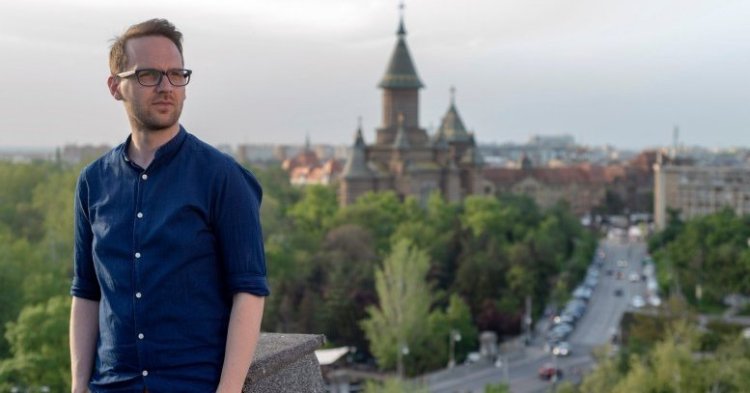And it’s not Iohannis. For those of you who don’t know: Klaus Iohannis, Romania’s sitting president – an ethnic German, part of the Transylvanian Saxon minority – has been the mayor of Sibiu for 14 years before becoming the President of Romania back in 2014.
Dominic Samuel Fritz, born in the town of Lörrach in Baden-Württemberg, bordering Switzerland and France, became USR’s mayoral candidate for Timisoara’s City Hall. He won the internal battle already in the first round after receiving more than 50% of the vote and his nomination has been met with great optimism and support by a rather apathetic electorate in Timisoara, that didn’t see any potential candidate standing against the incumbent mayor, PNL’s Nicolae Robu.
Dominic came to Timisoara for the first time in 2003 as a volunteer for the Jesuit European Volunteers association. He quickly fell in love with Romania’s beacon of multiculturalism and its potential. He now is fluent in Romanian and wants to become Timisoara’s mayor.
So what’s his plan, you may wonder? A German citizen wishing to become the mayor of a Romanian city (that has had a strong German influence in the past). I had the pleasure to interview Dominic and find out more about his vision and ambitions to become the mayor of a foreign city that became his home.
How does it feel like (and what are the challenges that come with) being a German citizen that wishes to become mayor in a Romanian city?
Before anything else, I am just a guy who wants to change some things in the city he loves and where he feels at home. So, I guess I feel like many other candidates who run for public office for the first time: energised, inspired and slightly sleep-deprived. I am aware that my citizenship sets me apart from my competitors. But it’s important to understand that I am not running as a lone German wolf, I am part of a growing and powerful movement of mostly young Romanians pushing for profound change in the country’s paralysed and corrupt political system.
The reactions to my nomination have been, so far, overwhelmingly positive. Timisoara has had many mayors with German names in its past, it’s a city with a uniquely multicultural identity. Some perceive my candidacy as a continuation of that history. Most people, however, don’t care what the colour of my passport is, they want to know how I can solve their problems, what my plans are for a cleaner city or for improving public transport.
What inspired you to run?
Romania finds itself at the crossroads, and many people realise that it’s now or never that the post-communist cliques and mentalities that have dominated the political system for the past 30 years can be overcome. But it doesn’t happen by itself. It needs all of us, and it needs to happen at the grassroots level. This is the basic idea of the new USR party.
Timisoara is an amazing city that has become my home. It has an enormous potential that is wasted by a chaotic and self-interested local administration. Many of my friends are active in civil society, culture or business, but most have been trying to stay away from local politics which is often toxic. This is now changing. We believe it’s time to change the system from the inside instead of allowing it to hamper the enthusiasm and involvement of so many Timisoarans, and I am excited to be part of that new coalition of change.
What do you wish to change? Where do you see Timisoara in 10 years from now?
Timisoara is uniquely positioned in the triangle between Budapest, Belgrade and Bucharest. It has a rich European history and a well-educated young generation. The city has all the ingredients to become once again a hub for cultural and economic innovation in Europe.
In the 19th century, Timisoara was the European frontrunner in urban mobility, and I expect many positive changes in the next 10 years around public transport or bike infrastructure. I also see great potential in developing a wider coherent metropolitan zone beyond the city limits – the suburbs have been growing quickly in the past years.
Not least, Timisoara will be European Capital of Culture in 2021 and should aspire to become an even stronger magnet for artists and the creative industries in the next decade.
For all of this to become reality, major changes will be needed in the way local administration is understood. The digitalisation of administrative processes and public services will be an important priority. The unprecedented transparency that comes with the digitalisation of governmental affairs will also be our most promising strategy in the fight against corruption and nepotism.
Are you the living proof of a European demos? Does your candidacy reflect this?
My candidacy is about Timisoara first and foremost: about resolving some very real problems its citizens are facing and about the immense opportunities this city has. I am not running to make a point about some lofty ideals. But of course, the history of Timisoara is a profoundly European one, and its economic and cultural promise is deeply intertwined with the future of Europe. In that sense, I do feel that my candidacy and the vision of what Timisoara stands for are part of a larger narrative: citizens are reclaiming their place in politics and are reinventing Europe from bottom-up, community by community. Those communities reflect more and more the cultural diversity and geographical flexibility of Europe – a reality for millions of Romanians living or working abroad. Local politics must therefore be seen not as an antipode of European politics, but as its anchor.


Follow the comments: |
|
